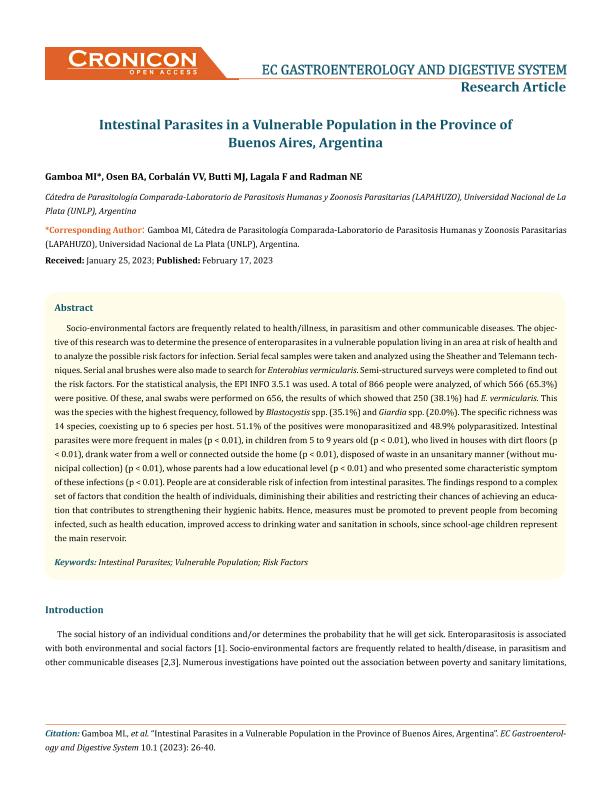Mostrar el registro sencillo del ítem
dc.contributor.author
Gamboa, María Inés

dc.contributor.author
Osen, Beatriz Amelia

dc.contributor.author
Corbalán, Valeria Vanesa

dc.contributor.author
Butti, M.J.
dc.contributor.author
Lagala, Fiamma Hebe

dc.contributor.author
Radman, Nilda Ester

dc.date.available
2024-02-19T11:17:29Z
dc.date.issued
2023-02
dc.identifier.citation
Gamboa, María Inés; Osen, Beatriz Amelia; Corbalán, Valeria Vanesa; Butti, M.J.; Lagala, Fiamma Hebe; et al.; Intestinal Parasites In A Vulnerable Population In The Province Of Buenos Aires, Argentina; Ecronicon; EC Gastroenterology and Digestive System; 10; 1; 2-2023; 26-40
dc.identifier.issn
2453-188X
dc.identifier.uri
http://hdl.handle.net/11336/227329
dc.description.abstract
Socio-environmental factors are frequently related to health/illness, in parasitism and other communicable diseases. The objective of this research was to determine the presence of enteroparasites in a vulnerable population living in an area at risk of health and to analyze the possible risk factors for infection. Serial fecal samples were taken and analyzed using the Sheather and Telemann techniques. Serial anal brushes were also made to search for Enterobius vermicularis. Semi-structured surveys were completed to find out the risk factors. For the statistical analysis, the EPI INFO 3.5.1 was used. A total of 866 people were analyzed, of which 566 (65.3%) were positive. Of these, anal swabs were performed on 656, the results of which showed that 250 (38.1%) had E. vermicularis. This was the species with the highest frequency, followed by Blastocystis spp. (35.1%) and Giardia spp. (20.0%). The specific richness was 14 species, coexisting up to 6 species per host. 51.1% of the positives were monoparasitized and 48.9% polyparasitized. Intestinal parasites were more frequent in males (p < 0.01), in children from 5 to 9 years old (p < 0.01), who lived in houses with dirt floors (p < 0.01), drank water from a well or connected outside the home (p < 0.01), disposed of waste in an unsanitary manner (without municipal collection) (p < 0.01), whose parents had a low educational level (p < 0.01) and who presented some characteristic symptom of these infections (p < 0.01). People are at considerable risk of infection from intestinal parasites. The findings respond to a complex set of factors that condition the health of individuals, diminishing their abilities and restricting their chances of achieving an education that contributes to strengthening their hygienic habits. Hence, measures must be promoted to prevent people from becoming infected, such as health education, improved access to drinking water and sanitation in schools, since school-age children represent the main reservoir.
dc.format
application/pdf
dc.language.iso
eng
dc.publisher
Ecronicon
dc.rights
info:eu-repo/semantics/openAccess
dc.rights.uri
https://creativecommons.org/licenses/by-nc-sa/2.5/ar/
dc.subject
Intestinal Parasites
dc.subject
Vulnerable population
dc.subject
Risk factors
dc.subject.classification
Parasitología

dc.subject.classification
Ciencias de la Salud

dc.subject.classification
CIENCIAS MÉDICAS Y DE LA SALUD

dc.title
Intestinal Parasites In A Vulnerable Population In The Province Of Buenos Aires, Argentina
dc.type
info:eu-repo/semantics/article
dc.type
info:ar-repo/semantics/artículo
dc.type
info:eu-repo/semantics/publishedVersion
dc.date.updated
2024-02-15T13:40:28Z
dc.journal.volume
10
dc.journal.number
1
dc.journal.pagination
26-40
dc.journal.pais
Reino Unido

dc.journal.ciudad
Londres
dc.description.fil
Fil: Gamboa, María Inés. Universidad Nacional de La Plata. Facultad de Ciencias Veterinarias. Departamento de Microbiología. Laboratorio de Parasitosis Humanas y Zoonosis Parasitarias; Argentina
dc.description.fil
Fil: Osen, Beatriz Amelia. Universidad Nacional de La Plata. Facultad de Ciencias Veterinarias. Departamento de Microbiología. Laboratorio de Parasitosis Humanas y Zoonosis Parasitarias; Argentina
dc.description.fil
Fil: Corbalán, Valeria Vanesa. Universidad Nacional de La Plata. Facultad de Ciencias Veterinarias. Departamento de Microbiología. Laboratorio de Parasitosis Humanas y Zoonosis Parasitarias; Argentina. Consejo Nacional de Investigaciones Científicas y Técnicas. Centro Científico Tecnológico Conicet - La Plata. Centro de Estudios Parasitológicos y de Vectores. Universidad Nacional de La Plata. Facultad de Ciencias Naturales y Museo. Centro de Estudios Parasitológicos y de Vectores; Argentina
dc.description.fil
Fil: Butti, M.J.. Universidad Nacional de La Plata. Facultad de Ciencias Veterinarias. Departamento de Microbiología. Laboratorio de Parasitosis Humanas y Zoonosis Parasitarias; Argentina
dc.description.fil
Fil: Lagala, Fiamma Hebe. Universidad Nacional de La Plata. Facultad de Ciencias Veterinarias. Departamento de Microbiología. Laboratorio de Parasitosis Humanas y Zoonosis Parasitarias; Argentina
dc.description.fil
Fil: Radman, Nilda Ester. Universidad Nacional de La Plata. Facultad de Ciencias Veterinarias. Departamento de Microbiología. Laboratorio de Parasitosis Humanas y Zoonosis Parasitarias; Argentina
dc.journal.title
EC Gastroenterology and Digestive System
dc.relation.alternativeid
info:eu-repo/semantics/altIdentifier/url/https://ecronicon.net/ecgds/intestinal-parasites-in-a-vulnerable-population-in-the-province-of-buenos-aires-argentina
Archivos asociados
